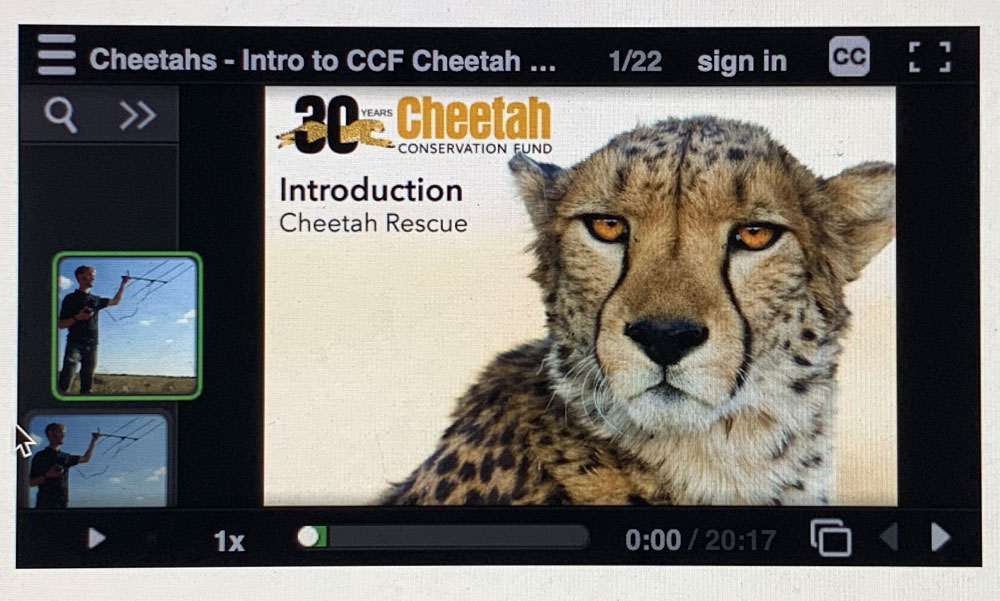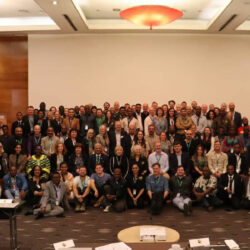Cheetah Conservation Fund Embraces Distance Learning and Increases Online Education Resources in Response to Pandemic
-

- by CCF Staff July 23, 2020
OTJIWARONGO, Namibia – 17 July 2020 – Driven by the need to change delivery of its wildlife education programming in Namibian schools and at its Centre because of the COVID-19 crisis, Cheetah Conservation Fund (CCF) has shifted its focus to Distance Learning to reach young learners. Prior to March 2020, the CCF Education Team conducted formal and informal environmental education programmes at CCF’s Centre on an almost daily basis, hosting school groups for day tours and for immersive, overnight experiences at CCF’s Camp Lightfoot. Over the past 20 years, more than 650,000 young learners have either been to CCF’s Field Research and Education Centre or participated in CCF outreach programmes in their local schools. But when local travel restrictions were imposed in Namibia mid-March, the CCF Education Team was forced to get creative to continue Future Conservationists of Africa, the official name of CCF’s education programme.
“In March, when the COVID-19 lockdowns started, we were not sure how long the situation would continue. But after two weeks, it became apparent we would need to adapt to move forward. While CCF has always endeavoured to make our materials available online, we decided to concentrate our attention on expanding this area, since it appears to be the way of the future”, said Dr Laurie Marker, CCF’s Founder and Executive Director.
With Distance Learning, the communication between teachers and learners is generally conducted via email, instant messaging, video conferencing and pre-recorded video lessons. Teachers can choose from a variety of new applications to create videos easily and independently. CCF chose Google VoiceThreads, a collaborative, multimedia slide show, to make its initial series of online lessons. VoiceThreads holds images, documents, and videos and allows users to navigate slides and leave comments that can be shared among young learners, parents and teachers. VoiceThreads are free and can be made by anyone with a basic Google account.
During the COVID-19 lockdown, the CCF Education Team made VoiceThreads about cheetahs and their role in the ecosystem, Livestock Guarding Dogs, predators and small stock, and CCF’s vegetable garden. The Team also shared its 4th Annual CCF Teacher’s Resource Guide, which includes a comprehensive cheetah curriculum directed towards 11 to 14-year-old learners, with more VoiceThreads that illustrate. Both the VoiceThreads and the PDF of the CCF Teacher’s Resource Guide are available for free download on the CCF website.

“The pandemic has severely impacted CCF’s ability to deliver its community outreach, training, and education activities in a face-to-face setting. It has also had a detrimental effect on the education of young people, none more than students in their all-important final year of school studies – grade 12 – integral to shaping career choices”, said Annetjie Siyaya, Research and Education Manager.
Edmodo makes technology, content and platforms to connect teachers, students and parents, no matter where they are physically located. Currently, CCF is testing Edmodo to help young learners discover their passions and improve their skills and bring families into the education process. CCF intends to use its new online learning platform, Edmodo, to provide career guidance and conservation leadership training to young learners in the post-pandemic era. To join the CCF Edmodo Group:
Teachers
Visit edmodo.com using your smartphone or computer.
Click or tap “Get Started as a Teacher.”
Follow the instructions to create an account.
After entering your name, click or tap “Have a Code? Join a Class or Group,” below “Explore Your Interests.”
Enter your CCF code: u22fsg
Students
Visit edmodo.com using your smartphone or computer.
Click or tap “Get Started as a Student.”
Follow the instructions on your screen. Use your CCF class code: rd4fj3.
Parents
Visit edmodo.com using your smartphone or computer.
Click or tap “Get Started as a Parent.”
Follow the instructions to create an account.
When prompted, enter your CCF student’s Parent Code. Parent Code can be found on the bottom left corner of the student’s home page.
CCF is developing additional resources for teachers to assist in delivering key concepts in conservation, through coursework in biology, ecology, and animal physiology, behaviour and distribution. In addition to young learners and teachers, CCF is designing Distance Learning programmes for regional youth groups, youth officials, health officials and farmers. These resources will be posted online with CCF’s other materials as they become available.
The CCF Centre in Otjiwarongo is normally an open-to-the-public facility. In March, the Centre closed for three months, as all tourism in Namibia came to a halt. Dr Laurie Marker hosted a video version of the CCF tour given to all visitors, and the CCF Tourism Team placed it on CCF’s www.cheetah.org website with the other Distance Learning materials, so tourists and young learners can have the experience of visiting the Centre virtually.
“We are incredibly excited about our new approach. Not only is this a creative and cost-effective solution for delivering education in Namibia during periods of restricted travel, but our education materials, staff and CCF Centre can be accessed by young learners all around the world at any time. This is a real game changer for CCF and wildlife education”, said Dr Marker.
# # #
Cheetah Conservation Fund
Conservation Fund (CCF) is the global leader in research and conservation of cheetahs and dedicated to saving the cheetah in the wild. Founded in 1990, CCF is an international non-profit organisation headquartered in Namibia. CCF is celebrating its 30th anniversary in 2020, making it the longest running and most successful cheetah conservation organisation. For more information, please visit www.cheetah.org
MEDIA CONTACTS:
Dr Laurie Marker, director@cheetah.org or +264 81 124 7887
Susan Yannetti, susan@cheetah.org or +12027167756
Related Reading


